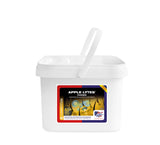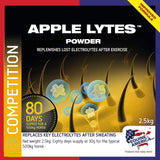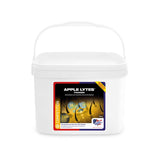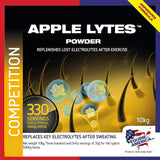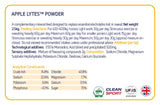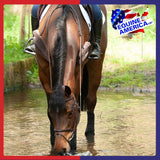APPLE LYTES™ POWDER
COMPETITION
Replenish lost Electrolytes after Exercise
Apple Lytes™ Powder have been carefully formulated to replace the key electrolytes and encourage drinking to help prevent dehydration and maintain peak performance all season.
Apple Lytes™ are highly palatable, and should be mixed in feed. Clean, fresh water should always be available.
An increase in body temperature, either as a result of exercise, travelling or high environmental temperature will cause the horse to sweat. The evaporation of this sweat helps the horse to cool down and regulate his body temperature.
Sweating causes fluid loss, together with the loss of body salts or electrolytes, which are contained in the sweat.
The important electrolytes are Sodium and Chloride, Potassium, Calcium and Magnesium and they play many key roles in the body, but especially muscle contraction, the nervous system, and maintaining the fluid balance around cells.
Potassium is usually supplied in abundance in the horse’s diet, as most forages such as pasture, hay and haylage are high in potassium.
Sodium and Chloride are found at much lower levels in forages, and even for horses in light work, sodium and chloride need to be provided on a daily basis.
Most compound feeds such as cubes and mixes, will provide some sodium and chloride in the form of salt, but if intakes are low, this may not provide enough, and supplemental electrolytes will be required. Similarly, hard working horses, especially in hot or humid conditions, will lose larger quantities of electrolytes and water in sweat. There will often not be enough in normal daily feed to replace these losses, and additional electrolytes will be needed to replenish these losses, encouraging the horse to drink and promote rehydration, to maintain health and performance.
A horse in moderate work, trotting and cantering, can lose as much as 5-7 litres of fluid, and 50-70g electrolytes in an hour, and this will increase as the work intensity or duration increases, and even more if the weather is hot and humid!
So maintaining hydration, and replacing lost electrolytes is important not only for elite competition horses, but for all horses and ponies who are sweating after work – from Pony Club rallies or long hacks in the summer, right through to international eventers, show jumpers and dressage horses!
Because horse sweat contains a higher concentration of sodium and chloride than his other body fluids, it is important that supplemental electrolytes are provided at the correct concentrations to ensure that the desire to drink is maintained, so fluid balance AND electrolyte losses can be restored, to promote recovery, and ensure continued optimum performance.
This is especially important during long distance travel, or longer show and events, when fatigue will increase, and performance will decline if electrolyte and fluid balance are not restored.
What are the benefits of Apple Lytes?
- Sodium, Potassium and Chloride levels are carefully balanced to provide optimum levels to promote drinking and restore electrolytes losses to maintain performance
- Calcium and Magnesium are also provided from bio-available sources.
- Low sugar and suitable for all horses and ponies
- Highly palatable, with an attractive apple/cherry flavour, and readily accepted even by fussy feeders.
Ingredients Per 30g Serving
| Sodium 6800mg | Potassium 2000mg |
|---|---|
| Chloride 12200mg | Calcium150mg |
| Magnesium 500mg | Dextrose 2200mg |
Pack size: 2.5kg (80 day supply), 10kg (330 servings),
Directions for use: For 400-600kg horses; Light work: 30g per day. Strenuous exercise or sweating heavily: 60g per day. Maximum; 60g per day. For 300-450kg ponies; Light work: 15g per day. Strenuous exercise or sweating heavily: 30g per day. Maximum; 30g per day. Do not exceed recommended intakes unless under veterinary advice.
Do you know the importance of Electrolytes in horses? Check out this video from Equine America's top Nutritionist Deborah Leabeater ![]()
![]()









